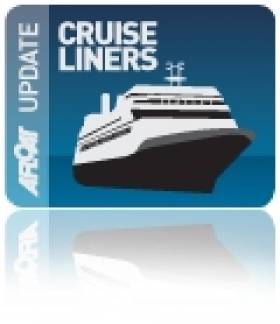Displaying items by tag: Irish regional ports
#CruiseShips- A mini-luxury cruiseship Sea Explorer docked in Dun Laoghaire Harbour today, fortunately without passengers on board, as a very unseasonable Dublin Bay was battered by a heavy snow squall, writes Jehan Ashmore.
As the Sea Explorer approached Dun Laoghaire Harbour, the pilot cutter 'Liffey' which set out from Dublin Port came alongside to transfer a pilot aboard the 4,200 tonne vessel which was arriving on a passage from Cadiz.
Sea Explorer which has a passenger capacity for 116 passengers is to remain moored in the harbour albeit in a 'lay-up' mode in advance to taking up a European season with cruises starting in June from a temporary 'homeport'.
It is the norm for cruiseships to reposition between seasons and operating regions around the world, such as the Caribbean and Mediterranean and relocate to a designated homeport.
As previously reported on Afloat.ie, Dun Laoghaire Harbour is expected to receive up to 14 cruise calls this season, including the highlight call of Cunard Line's flagship liner 'QM2' on 16 May.
Also reported was yesterday's launch of the National Ports Policy where Minister for Transport, Leo Varadkar announced that Dun Laoghaire Harbour along with four other ports were classed as having 'regional significance'.
In the case of Dun Laoghaire Harbour, the development of the port is to be in line with local requirements focusing on tourism, cruise liners and marine leisure activity.
The ports are to be transferred to the control of local authorities in a move that will require legislation which may take up to 18 months to complete.
Meanwhile, Sea Explorer will be sharing the same quayside at the ferry terminal with the new Dublin Bay Cruises excursion vessel, St. Bridget.
On the adjacent berth is another vessel with a similar name to the cruiseship, that being the HSS Stena Explorer which operates the seasonal-only fast-craft ferry service to Holyhead.
Finally, the port has also been engaged in a return to cargsoships with the third batch of Guinness fermentation tanks, which were discharged from the Blue Tune on Monday. This final batch are bound for the St. James's Gate Brewery plant in Dublin.
























































